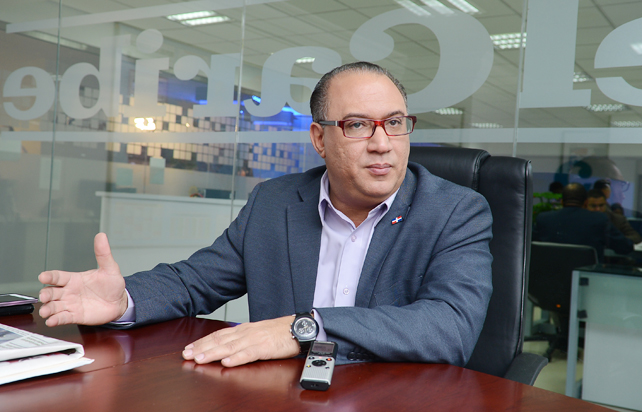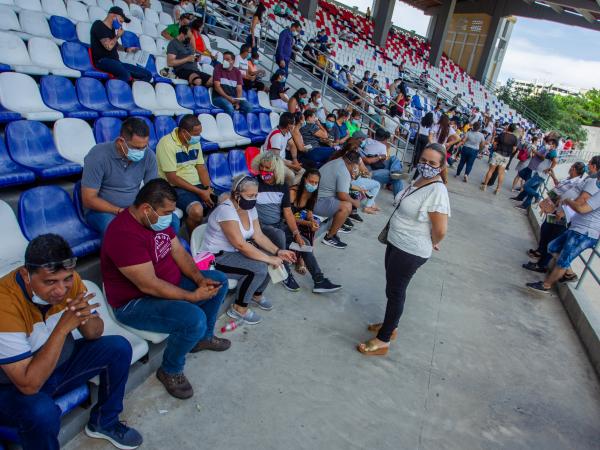“Learning by Doing tries to put into practice the climate action instruments that we have”
The Learning by Doing (LbD) project was recently launched in the country, which is part of global and regional actions for adaptation and resilience to the impacts of climate change, and to contribute to mitigating gas emissions. greenhouse effect.
Omar Ramírez Tejada is the manager in the Dominican Republic of Energeia Network, the institution responsible for its implementation in the country, and he spoke extensively about the initiative
1. Could you explain what Learning by Doing is?
The national interest in combating climate change presents an excellent opportunity for the country to consolidate the process of its transition towards a low-carbon and more resilient economy, supported by a sustainable, inclusive and balanced development model. The Learning by Doing (LbD) project is an international initiative that supports the national climate agenda and its implementation strategies.
For this reason, it is based on a recognition of government leadership, the transformations promoted by civil society and the great capacity and experience of our business community, carried out with commitments for climate action.
In this sense, LbD was born with the spirit of putting into practice the ideas raised in the climate action instruments that we already have and supporting the institutions of the Dominican government, the private sector and academia to create others that are necessary.2
2.What products will this project provide?
The first aspect of the project is to develop socio-economic, cultural and ecological visions of the societies of the countries and specific sectors, whose net emissions are close to zero; as they become more and more able to adapt to 2 ° C – 1.5 ° C the temperature increases.
This seeks to facilitate the possible periodic transformation and preservation, and the policies, practices, technologies and skills necessary to carry them out. Fundamentally, the whole approach is used as a learning exercise, that is, learning by doing. Additional products are also contemplated in the national and multilateral portfolios of projects and policies, necessary to enable them.
3.What information will you use for these scenarios?
We will build on previous work by Energeia and others on low-carbon societies, as well as conducting a baseline study in each country where the project is implemented.
The most distant origin of this involved a project between the UK and Japan between 2007 and 2011. This project focused on visualizing low-carbon societies with deep cuts (80% -90%) of emissions in absolute terms, using differentiated views such as highly technological or in changes more rooted in nature and more aligned with traditional customs, associated institutions, practices and infrastructure.
Most recently, Energeia advised the current presidency of the Conference of the Parties (COP) on a net zero trajectory, and last year’s G20 Troika. In doing this, he further advanced visions of decarbonization by replacing sources and using circular economies, taking into account a logic analogous to that described with respect to hydrogen and carbon in hydrocarbons.
On the adaptation side, it integrated an approach that is based on synergies and tries to adapt not only to climate impacts, but also to how societies and industries adapt.
4.How will they get to those products?
We will use various learning, knowledge management and dissemination opportunities as a way to convey to the wider society a better understanding of what is feasible, how it can be achieved as a whole, where the challenges lie and what life would be like, including in sectors that people would normally say are difficult to decarbonize.
LbD is built on an iterative methodology that engages various types of stakeholders in workshops to think strategically over a time interval and seeks to annually produce all project results at once, rather than in sequence. This allows participants to see how well, or not, the proposed results fit.
In order to systematize new knowledge and skills as they emerge, through surveys and interviews, creation of draft mind maps, process portfolios and possible solutions, findings are collected and compared annually to construct stories and design charts that illustrate those insights for its diffusion.
He said that it is an international project. Which entity contributes the funds for its execution and where else is it being carried out?
It is an international and multidisciplinary project that involves teams from South Africa, Lebanon, the United Kingdom, Mexico and the Dominican Republic, with a regional component that covers Latin America and the Caribbean.
It is implemented by Energeia (United Kingdom / Mexico) and the Economic and Social Research Consortium (CIES) (Peru), with the University of Cape Town (South Africa), the Autonomous Technological Institute of Mexico (ITAM) (Mexico), the Consortium LbD (Dominican Republic), IndyAct (Lebanon) and the United Nations Economic Commission for Latin America and the Caribbean (ECLAC) (Latin America and the Caribbean Region) as partners. It is funded by the International Climate Initiative (IKI) of the Federal Republic of Germany.
5. Would you like to add anything else that you consider relevant to this interview?
There is a final dimension that should be mentioned when considering the LbD components: the need to address what is a good life or what other authors call well-being with dignity in the context of these visions, policies and projects.
For example, Energeia carried out a series of zero-net models and trajectories for several Latin American countries.
When considering the replacement of coal-fired power plants it was easy to imagine a situation where capacity credits will be paid to displaced power plants that can no longer dispatch.
Plant owners emerge relatively unscathed from these transitions, but the workforce runs the risk of being decimated or left with stranded skills.
A second point is the need to focus not only on behavior, which can be understood as a response to incentives, but also on the results of decisive action in the creation of these societies and in the advancement of skills, values and skills. the practices associated with them.
The longer time frame of this project allows us to think outside the constraints of more immediate legislative and regulatory concerns. Fundamentally, this combination allows participants to consider what to take into account in the broader perspective of the vision generated, which would otherwise be obscured, and allows the space to consider what it means to live a life well lived.














